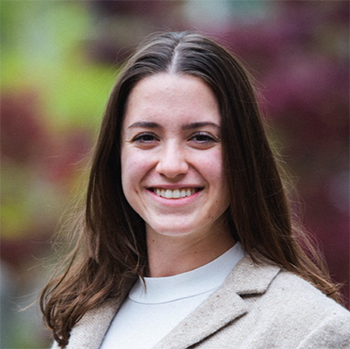
Madelyn Focaracci
What is your next adventure?
In February, I will be moving to the Boston area and starting my first full-time job as an air vehicle associate engineer at Aurora Flight Sciences. I’ll be part of an experimental rotation program so I’ll get to work on different teams and try different things like software or configuration and loads.
What about your next adventure are you most looking forward to?
I’m excited to help design airplanes. Working on airplanes has always been a huge dream of mine so it feels like a dream being fulfilled and I’m excited to actually get to do that.
I got my undergraduate degree at MIT so I’m also looking forward to going back to a familiar spot, even though it will be during the dead of winter.
Did you have any previous co-op, internship, or research experience in this area?
As an undergraduate, I worked as a software engineering intern at Northrop Grumman and then later I was a flight sciences intern at Boeing. Just before I started graduate school I interned at Boeing again, but this time as an aircraft configuration and integration intern.
As a master’s student in the Aerospace Systems Design Lab (ASDL) I’ve had a lot of opportunities and exposure to aircraft and systems design, especially through the Grand Challenge projects. One of the Grand Challenges I was working on was a really good experience for what I’m going to be doing at my new job. My team worked on a conceptual design for a high-speed vertical takeoff and landing vehicle, and stepping through that project helped me get experience with aircraft configuration on top of things I learned during my undergraduate and internship experiences. The final presentation that my team gave for that project was something that made me feel confident in my abilities, I presented it again for my interview at Aurora.
How did your educational experience at Georgia Tech help you to achieve your goals?
The educational experience I got through ASDL was pretty unique compared to the academic experience I had during undergrad. Going through the two Grand Challenges during my first year as a master’s student was extremely beneficial because it was more geared towards the aerospace industry rather than towards something more theoretical. It was awesome to be able to work on two group projects, working with a small team, which gave me more responsibility and ownership. It helps to be put in scenarios where you learn about team dynamics and how you relate to the people that you work with because it’s something you know you’ll use in the real world as you start your career in engineering.
My advisor, Dr. Mavris, does a really good job of bringing in the business side of aerospace, so that we better understand the industry beyond the science and engineering. We’re learning about things like airline profit margins and the perspective of an airplane manufacturer and how they relate to the people designing the airlines. It makes the educational experience that much more invaluable.
What advice would you give to an underclassman who would like to follow the same path?
Don’t be intimidated by things that seem difficult. I was a big perfectionist coming into Tech and was always a bit afraid to try something and fail. But trying and failing is what helps you become better at whatever it is you are trying to do. I think it’s an experience you have to embrace as you go through school and beyond.